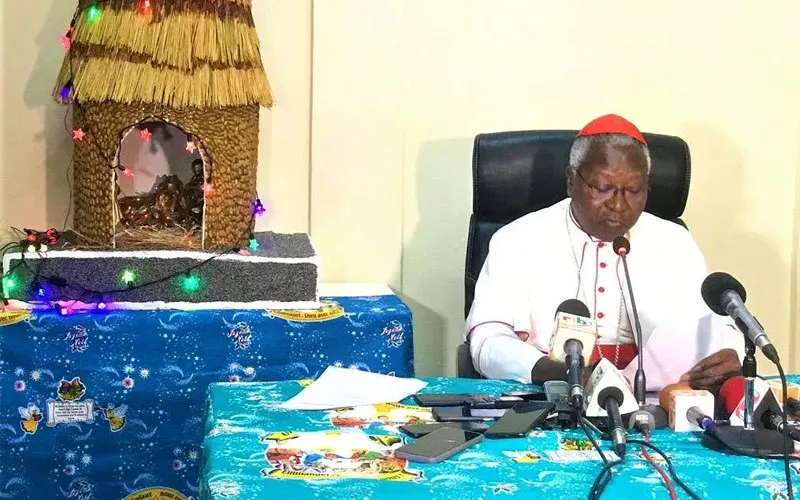
The Cardinal in Burkina Faso has called upon the people of God in the West African nation to put aside weapons of violent conflict and give dialogue a chance.
In his message for Christmas 2022 and New Year 2023, Philippe Cardinal Ouédraogo says, “The year 2022 which is coming to an end will have been particularly painful.”
“Our country, Burkina Faso, has been caught, since 2015, in a spiral of violence and murderous terrorist attacks with dramatic humanitarian consequences,” Cardinal Ouédraogo laments in his message issued December 22.
He adds, “In all camps, we record and deplore the loss of human life. Community conflicts, stigmatization, marginalization, exclusion, injustice and bad governance are fertile grounds for terrorism.”
“The world is suffering with the war in Ukraine; Africa is suffering because of terrorism. But everywhere, the common thread that leads to this violence is the same: the loss of the meaning of human life, of the common good, because of the search for selfish personal or group interests,” Cardinal Ouédraogo decries.
He emphasizes the need to end the violent conflict in the West African nation, saying, “Let us keep our weapons silent in favor of dialogue for a fraternal living together.”
“Let us not be selfish or egocentric. Let us have the courage to ask God for forgiveness, the courage to ask him to enlighten us to seriously take the path of repentance, the path of unity and reconciliation,” the Cardinal says, and adds, “Together, let us break down the walls of hatred and selfishness and build bridges of understanding, forgiveness, brotherhood, and true love.”
The immediate former President of the Symposium of Episcopal Conferences of Africa and Madagascar (SECAM) further says, “We are all sons and daughters in the image of God, we are sons and daughters of God; we are each endowed with the will and courage to build peace.”
“May God touch our hearts, the hearts of those who die, the hearts of those who cause death, so that we all commit ourselves to non-violence and social dialogue, because all human life is sacred,” the Catholic Church leader who was elevated to Cardinal in February 2014 implores in his message titled, “Celebrate with dignity but in sobriety, solidarity and sharing”.
He goes on to reflect on the political situation in Burkina Faso, saying, “This year, at some point, we all heard the voice of the Transition authorities of our country enunciate the long list of evils from which our fellow citizens suffer and their commitment to do better. These evils constitute a serious sin.”
Cardinal Ouédraogo invites “not only Christians, but also men and women of good will, to seriously undertake a service of solidarity and fraternity in favor of our suffering brothers and sisters, by placing on them a look of love and concrete gestures of compassion and mercy.”
The 77-year-old Cardinal who started his Episcopal Ministry in November 1996 as Bishop of of Burkina Faso’s Ouahigouya Diocese notes that a “sense of responsibility must guide every Burkinabe, especially the leaders of civil society organizations.”
“The situation in our country is already alarming, volatile and very precarious,” Cardinal Ouédraogo says, and adds, “Let us not add to the problems that already exist, but let us all work to strengthen security and stability.”
He further says, “All citizens must understand that our common enemy is the terrorist threat, violence, evil, not people, religions, ethnicities.”
Reflecting on the situation of the Burkinabe youth, the Local Ordinary of Ouagadougou Archdiocese says, “Young people are the present and the future of a nation.”
“Let us dream of a new Burkina Faso in which the future of young people, their anxieties and aspirations are taken into account,” the the Burkinabe Cardinal says.
Making reference to the Feast of the Nativity of The Lord, Cardinal Ouédraogo poses, “What can the birth of a child solve in the face of dramatic situations, in the face of terrorism, in the face of the nuclear threat, in the face of the arrogance, and violence of the powerful, of men?”
These questions, he says, “touch on the very meaning of life as an adventure of solidarity and on politics as a service.”
“Following the example of our Lord Jesus Christ who came to serve and give his life for the many, all authority and power in this world is nothing other than a service, a total gift of self for the good of all, for the common good,” he adds.
Cardinal Ouédraogo further says, “Christmas is also the hope of a new world.”
“We all need to put our trust and hope in God who, in the face of the great evil of the world, gives us an answer by sending his only Son Jesus, who comes among men bringing Hope and Joy: the joy of a family, where everyone is loved and cared for, starting with the weakest, the most unfortunate,” he adds.
“The most beautiful Christmas gift that the Lord can give us is Peace,” the Cardinal emphasizes, and adds, “We are all called to open the door of our hearts to this light, to become children of God.”
He notes that “our powerful and effective Kalashnikov of response to radicalization and violent extremism is prayer, accompanied by the efforts of all, including dialogue, tolerance and mutual love.”
Cardinal Ouédraogo calls for “dignified festive celebrations,” urging the people of God in Burkina Faso to celebrate in “sobriety and solidarity”.
He goes on to advocate “for sharing, for the mobilization of resources and for the taking of urgent measures to help the populations in distress.”
“In this regard, in each parish and institution of our Archdiocese, the first collection of Christmas and New Year celebrations will be made for the benefit of internally displaced persons, widows and orphans and the poor,” the Catholic Church leader says.
He implores, “May the Prince of Peace who comes at Christmas bless and protect Burkina Faso, Africa and the whole world from all evil.”
